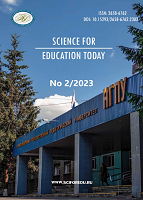Values in foundation of modern globalizing society: Change study
Values in foundation of modern globalizing society: Change study
Author(s): Madina Serikbekovna Ashilova, Alibek Serikbekovich Begalinov, Yury Viktorovich Pushkarev, Kalimash Kapsamarovna Begalinova, Elena Aleksandrovna PushkarevaSubject(s): Social Philosophy, School education, Educational Psychology, State/Government and Education, Health and medicine and law, Globalization, Sociology of Education
Published by: Новосибирский государственный педагогический университет
Keywords: Philosophy of education; Pandemic; Educational values; Axiology; Educational goals; Educational transformation; Crisis of values;
Summary/Abstract: Introduction. The modern era is experiencing a prolonged pandemic, migration issues, conflicts, and other global catastrophes. Many researchers see the cause of these problems in the crisis of traditional values, which is becoming increasingly apparent today. Values and value orientations are an integral part of human life and culture. They determine life goals, as well as ways and means of achieving them. Global catastrophes and continuous social changes lead to the transformation of the value system, which is reflected in scholarly literature, as researchers primarily react to particularly acute and relevant problems of modern times. The main goal of this study is to reveal values which constitute the foundations of modern globalizing society and to describe their recent transformations. Materials and Methods. In this regard, an analysis of scholarly literature devoted to the issues of values was conducted. The universal classification of values proposed by S. Schwartz was used as the basis for the analysis. The main methodology was content analysis of scholarly literature for the prevalence and occurrence of the main types of values in scientific works in the Web of Science database from 2017 to 2022. Results. Research findings include the following: 1) the prevalence and use of all types of values has been increasing for the period; 2) the dominance of individualistic egoistic values over public collective values; 3) the most common categories of values are: independence, health, success, responsibility, and capability. The least common values are: open-mindedness, common preferences, self-indulgence, respect for elders, mature love, and true friendship; 4) in recent years despite social upheavals, the main values of society have not changed. Thus, it can be concluded that spiritual values do not generate as much scientific interest as material values. Although the pandemic was able to make people reflect on the moral foundations of their life, it did not significantly affect the re-evaluation of modern values. However, the researchers emphasize that within a decaying culture, some precursors of the emerging (post-technocratic) culture are developing. According to them, the new worldview will be built on overcoming anthropocentric attitudes. Conclusions. This study will complement the understanding of the transformation of modern values under the influence of the pandemic, globalization, crises, and other factors. Its results will be useful to educators in higher education institutions, education philosophers, and anyone interested in higher education problems.
Journal: Science for Education Today
- Issue Year: 13/2023
- Issue No: 2
- Page Range: 99-121
- Page Count: 23
- Language: English

